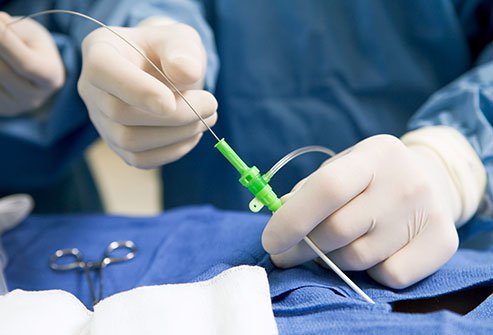What Is a Catheter Ablation Procedure?
Catheter ablation or cardiac ablation is a minimally invasive surgical procedure to treat abnormal heart rhythms. During this procedure, the doctor may destroy tiny areas in the heart that are firing off abnormal electrical impulses and causing abnormal heart rhythms.
- The patient may be given local or general anesthesia to numb the pain.
- Thin, flexible wires called catheters are inserted into a vein through a small cut, typically in the groin or neck, and threaded up into the heart.
- There is an electrode at the tip of the wires. The electrode sends out radio waves that create heat. This heat destroys the heart tissue that causes abnormal heart rhythms. Electrodes on the end of the catheter create tiny scars on the wall of your heart.
- In some instances, the doctor may use freezing cold to destroy the heart tissue.
- Sometimes, abnormal impulses come from inside a pulmonary vein and cause abnormal heart rhythms. (The pulmonary veins bring blood back from the lungs to the heart.) Catheter ablation in a pulmonary vein can block these impulses and keep abnormal heart rhymes from happening.
- Catheter ablations typically take 3-6 hours. After ablation, the patient will wait several hours in the recovery area.
- Most patients who have ablation procedures go home the same day, while some patients need to stay overnight in the hospital.
- For 2 or 3 days after your procedure, the patient may have these symptoms:
- Tiredness or weakness
- Achy feeling in the chest
- Skipped heartbeats or times when your heartbeat is very fast or irregular
- Depending on the results of the ablation procedure, the patient may still need to take medication to help control arrhythmias. Some people may require repeat cardiac ablation treatment at some point.
Common conditions or the types of abnormal heart rhythms that are treated by cardiac ablation procedure include:
- Atrial fibrillation: Atrial fibrillation (AF) is the most common type of cardiac arrhythmia (irregular heart rate or rhythm), and it is the most common cause of stroke, affecting 3.5 million Americans. AF occurs when electrical signals from the heart’s two upper chambers ‘fibrillate’ or quiver.
- Atrial flutter: Atrial flutter (AFL) is a condition related to atrial fibrillation, but it's an entirely separate rhythm with its own specialized therapies. AFL occurs when the upper chambers (atria) of the heart flutter at a regular and rapid rate, usually around 250-300 beats per minute. It typically generates a steady heart rate of 150 bpm because not every “flutter” conducts down the heart’s electrical tree. This is usually a hereditary and not an acquired heart problem.
- Ventricular tachycardia: Ventricular tachycardia (VT) is a rapid type of heartbeat that starts in the lower part of the heart (ventricles). VT is a potentially lethal arrhythmia and can lead to cardiac arrest. Anyone with a diagnosis of this arrhythmia must seek emergency medical attention during an episode. Typically, VT occurs in patients with abnormal hearts most commonly due to a history of heart attacks and/or heart failure.
What are the risks involved in catheter ablation?
Even with minimally invasive ablation procedures, there are several risks that you should know about:
- Bleeding at the site of incision
- Puncture of the heart
- Damage to blood vessels
- Blood clots
- Worsened arrhythmia symptoms
- Heart tissue inflammation (pericarditis)
- Collapsed lung from deflating the lung in surgery, which is correctable with a chest tube
- Heart muscle or heart nerve damage
- Infection
- Leg nerve injury
- Stroke or heart attack
- Very rarely, the procedure causes death
What are the precautions after catheter ablation?
Ablation procedures can be very successful, but for some people, they may need to have it repeated. Medications may need to be continued even after ablation. There is a range of changes you can make to your lifestyle that may help to improve your heart health and prevent further problems. These include:
- Avoiding stimulants, such as caffeine like in coffee, alcohol, and nicotine from smoking.
- Have blood pressure and cholesterol monitored regularly and keep them under control.
- Be active. Check with the doctor or nurse to know the safe and reasonable level of activity or exercise for you before you start.
- Reduce stress and find ways to manage or control any stress you cannot avoid.
- Eat heart-healthy foods and maintain a healthy weight.
- Go for regular checkups. They will help you maintain your quality of life.

